Darryl's achievements as an Accredited Advisor show dedication and commitment to the values of FBA. He has demonstrated unwavering support for individuals, families, and family businesses, helping them navigate the complexities of personal and professional dynamics.
Darryl's extensive background as both a clinical and organisational psychologist, coupled with his accreditation as a personal and executive coach, has equipped him with a wealth of skills and knowledge to assist family businesses to connect across generations and navigate complex interpersonal dynamics. Darryl's role in advising on strategy, family governance, succession planning, and resolving family conflicts has been instrumental in the evolution of numerous family businesses.
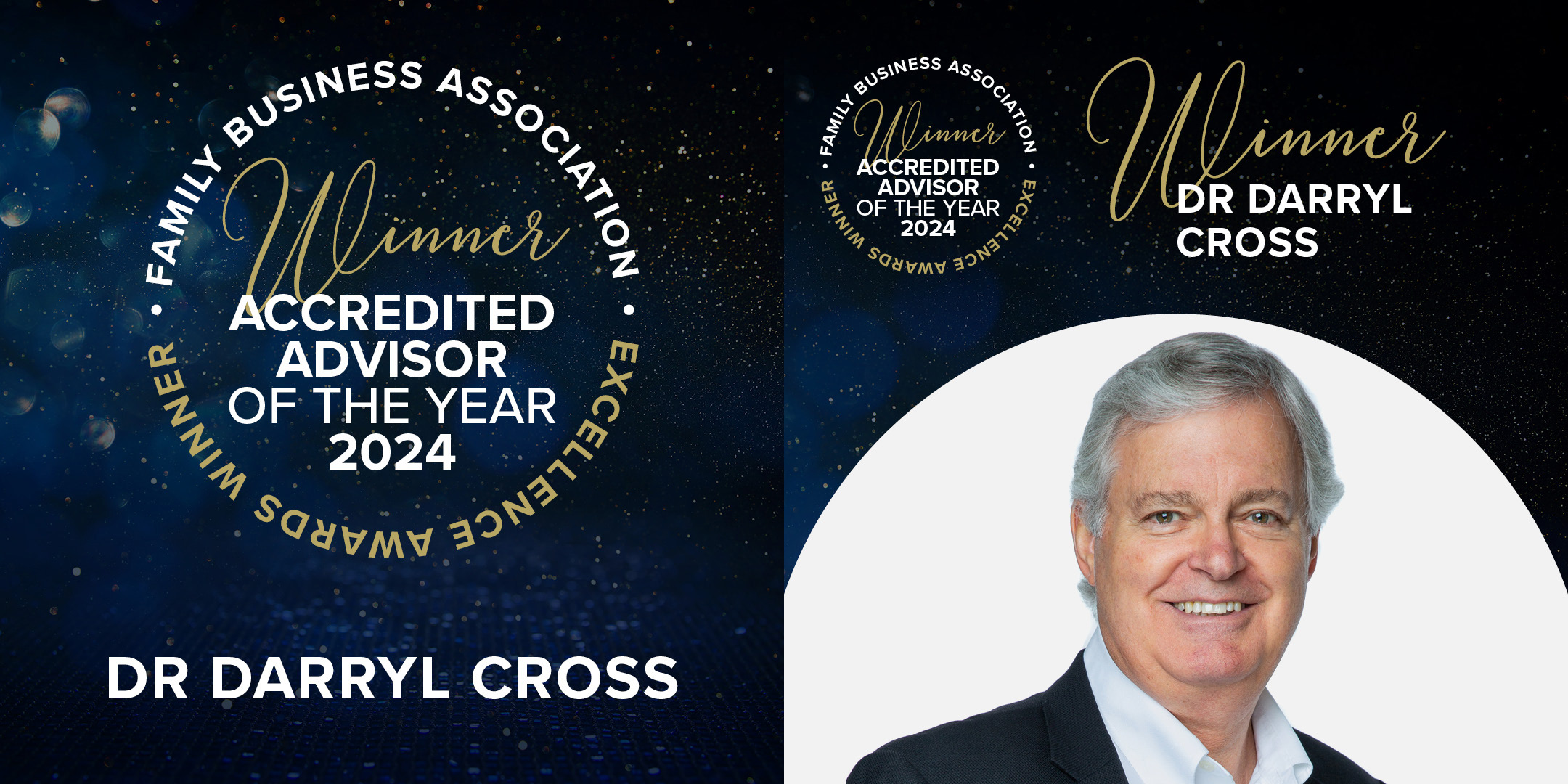

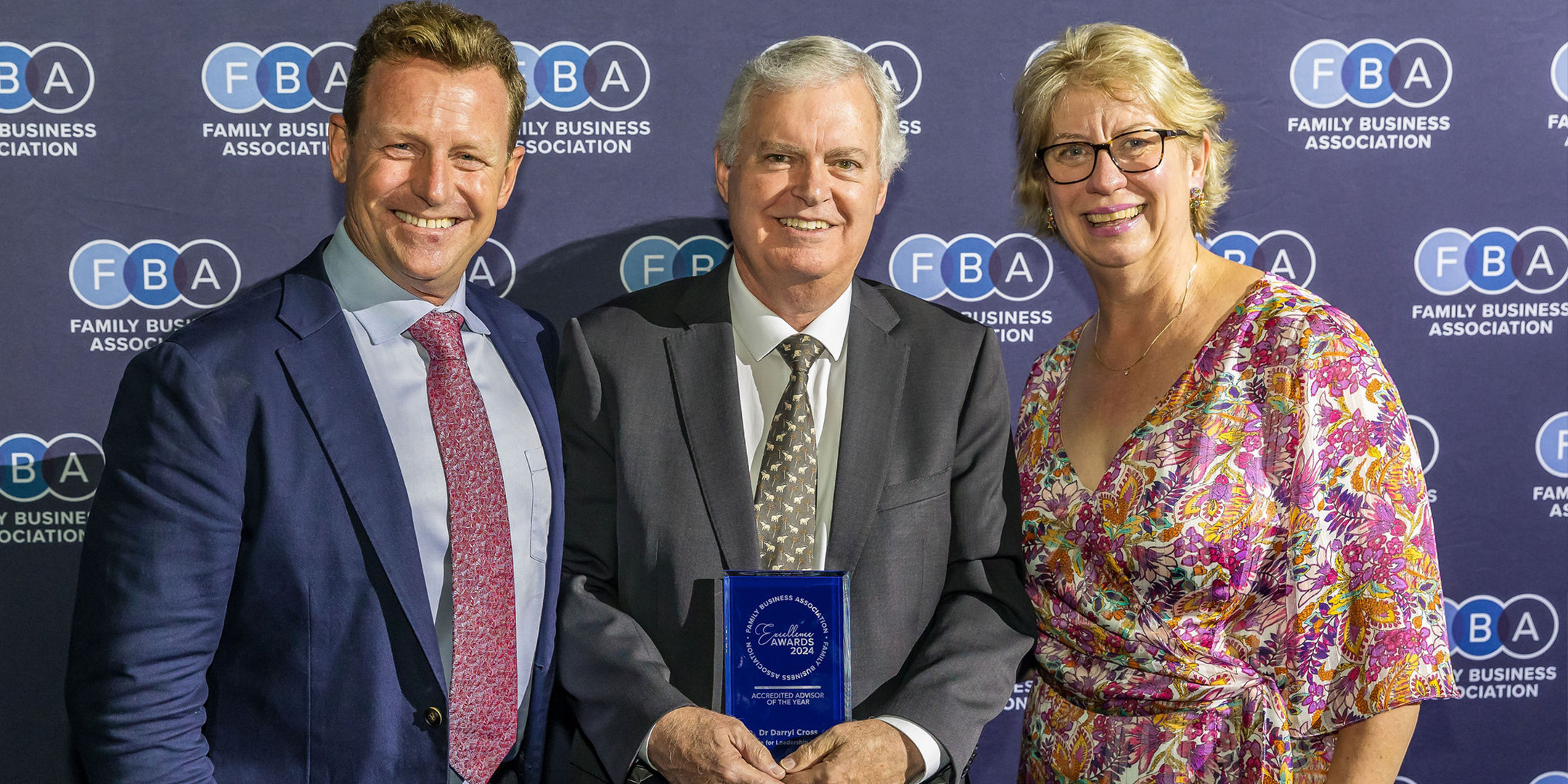
Business is One Thing...Family Businesses are Another
Family Business occurs when families are in business together. Usually a parent (typically the father or grandfather, but occasionally the mother) starts the business and builds it from humble beginnings to a profitable business over time. It might be a first generation family business, or for example, a business of longevity being a fourth or fifth generation or beyond.
However, you might have heard the saying that, "The first generation makes it, the second maintains it, and the third generation spends it."
Families can be complex networks at the best of times and provide intriguing interactions with agendas and 'sub-texts' of all kinds being played out. However, when there is both Power and Money involved, the agendas become larger and more emotional and often more devastating.
More often than not Egos get involved and emotions such as anger and then resentment or depression and sadness set in.
Then there is often envy and jealousy ("Your brother has a new car so why haven't you?" "They've just put in a new kitchen, so why can't we?" "Your sister has just gone overseas on holiday with her family, so when are we going on a nice holiday like that?") not to mention a sense of entitlement ("I should be running this place"; "I know more about this business than anyone, so I should be in charge now") usually from the younger generation.
It's not hard to see that this starts to destroy families that once communicated and interacted well and that once loved and cared for each other.
As well as the personalities (and egos) that are involved in a family business, there is a complex interplay of roles and responsibilities that can complicate relationships and interactions. Some individuals for example, can hold down a number of roles at any one time. For example see the diagram below.

The business owner for instance, could also be an entrepreneur/investor, a board member, a family council member, a family leader, a philanthropist as well as being an executive (and usually the CEO) in the business. This is indeed a complex interplay of roles. How does one juggle these roles?
When a family member in a family business speaks and acts, do they speak with their family hat on, their business hat or any other hat that they might be wearing?
As Professor Randel S Carlock reminded us at the 2013 FBA National Conference in Hobart, Tasmania (Australia);
"Family businesses fail not because of the business, but because of the family."
A sobering thought really. And sad.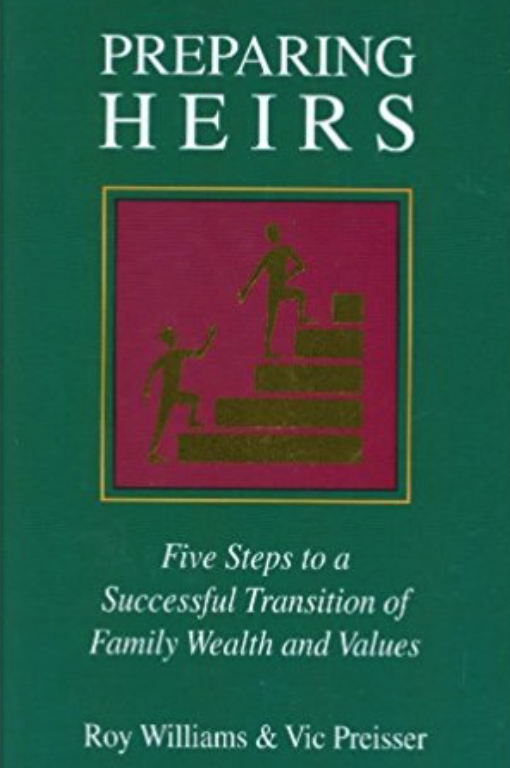
The authors Roy Williams and Vic Preisser in their 2003 book titled, "Preparing the Heirs" researched 3,250 family businesses in transition from one generation to the next. What did they find?
* There was a 70% failure rate; only 30% made it through
* 85% of the failures were attributed to:
- Breakdown of communication and trust in the family (60%)
- Inadequate preparation of the heirs (25%)
In my experience, the research by Willliams and Preisser is entirely true. The key is effective, open and transparent communication which builds sounds relationships and trust. However, poor or abrupt communication (or indeed no communication at all) mixed with a share of rumour, gossip, blame, and criticisms thrown in with a touch of envy, jealousy, anger, and resentment leads to a highly explosive cocktail of dysfunction. This builds of course, over time. Sadly, if it is not caught in time, it may be an irretrievable situation.
Again, in my experience, it is very frustrating to called in as a consultant/coach as chaos looms and it becomes a "search and rescue" mission rather than a healthy proactive and preventative mission.
Frequently, the so-called agendas get more complex and intense too when there is a divorce or separation or when marriages occur such as when the children marry and their partners perhaps begin to have influence or persuasive power over their spouse.
The result is devastation, hurt, and chaos. Sometimes, the damage cannot be controlled. Sometimes, the relationships deteriorate to such an extent that family members do not talk to each other and have nothing to do with each other. And the pain never goes away...
It doesn't have to be that way.
Prior Planning Prevents Poor Performance (The 5 Ps)
You've heard the quote before regarding the 5 Ps. Nothing is more surer than this for family businesses. As I've said above, business is hard enough as it is, but throw in family dynamics involving power, money and egos and we have a volatile cocktail.
Business typically has a set of planning processes that help it all function. In turn, family businesses need to have a second and duplicate form of those same processes. Please see the diagram below courtesy of Professor Randel Carlock from his Master Class (17 August, 2017) at the Family Business Conference held in Melbourne, Australia.
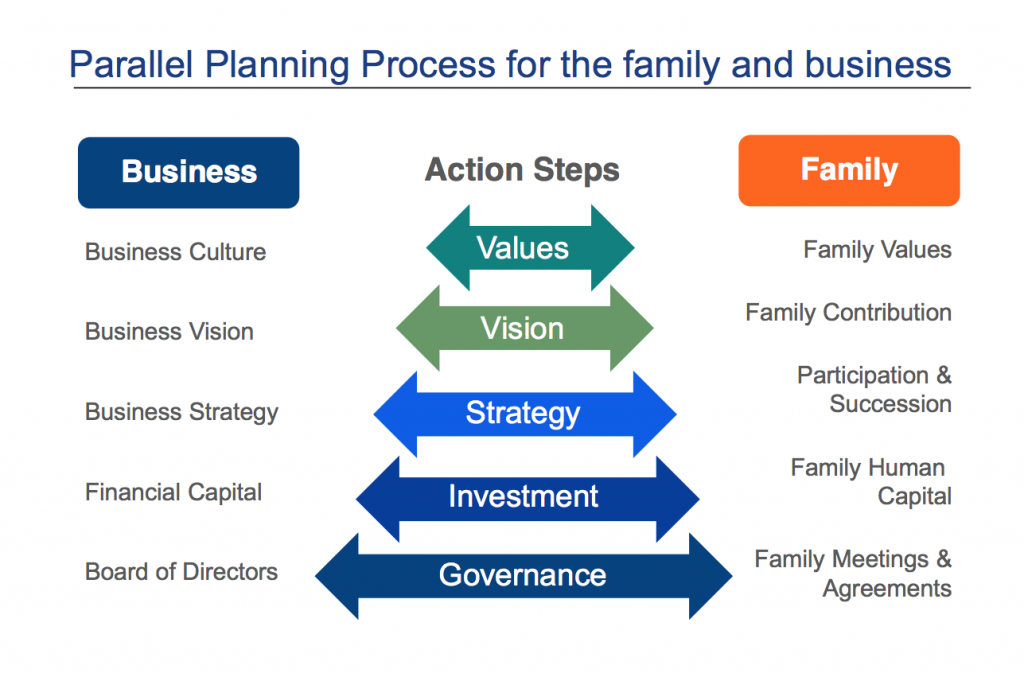
The major questions usually surround issues such as:
Succession planning -- Who will take over and when? Does it have to be a family member? Who is considered the most desirable successor? Is the current person in charge ready to give over the reins, and if not, what needs to happen to transfer the power and running of the business?
Who works in the business? -- Who wants to work in the business and what might their role be not only in the early stages, but as they progress through the company? Who is going to mentor them as they progress or do we simply leave it up to "luck" or "good fortune?" How do we manage others in the business when they see the "off-spring" joining the company?
When do they join the business? -- Do they join straight from school or do they gain outside experience first and if so, for how long? If outside the business for a period, who monitors their progress and what skills and abilities they are acquiring?
Who gets what when? -- Are some family members silent shareholders, and if so, what is their dividend and when does it come?
Is only the family involved? -- Who makes the decisions re the family business? Is it just the family of origin (eg, mother, father and children) or does it also include the extended family (eg, wives, husbands, children of the original children etc)? What role, if any, do the out-laws (extended family) have? Can they too work in the business?
The Psychology Advisor as a Consultant/Coach
While it is certainly true that Family Business Advisors range across many fields (eg., Behavioural Science or Psychology, Law, Management and Finance), it is often the complexities of communication and relationships that can deeply interfere with the running of a profitable business. This is where the "Psychology Advisor" can provide significant assistance as a consultant/coach.
So in what areas does the 'psychology advisor' assist in the area of family business?
| Behavioural Science | |
|---|---|
| Content | Family Systems Life Cycle Family Functioning & Relationships Addressing Conflict Communication (& Lack of) Birth Order Human Development Ethics & Values |
| Process | Action Research Listening & Facilitating Trusted Advising Parallel Planning the Business and the Family Hand-in-Hand |
(Table presented by Prof RS Carlock, in presentation titled, "Family Business Advisor
Master Class," FBA National Conference, 22 August, 2013 held in Hobart, Tasmania)
The process of resolving these issues does not happen overnight (they weren't created overnight either!), but it involves communicating with each family member, understanding the concerns and endeavouring to bring about a consensus. See the flow chart diagram below.
Sometimes, some family member's egos are difficult to shift, but the process is still the same, Communication and Consensus.
In many cases, this process starts with:
(1) An understanding of who we all are in the family. Self-awareness is a hallmark of leadership. What is each individual's story? What is their purpose -- do they have one? What is their ambition? What are their strengths? What are differences in the family? Can these complement each other? How would the family describe each other? Can we appreciate each other's strengths and differences?
(2) There is often a need for an examination of what each individual stands for. What are his or her values? What's important to them? And what therefore, based on the individual's values are the values of the family? What does the family stand for?
(3) There is often the need to learn how to communicate effectively. How do we really listen to each other? How do we stop rehearsing in our head what we are going to say as soon as we can grab a conversational opening in order to sort them out! How do we stop interrupting or talking over each other? How do we communicate on sensitive matters? How do we handle conflict or disagreement?
(4) There is usually the need to put down the principles, rules or guidelines of the family. What do we understand are the rules for being employed, terminated, and remunerated? What are the rules for succession and so on? Better to sort out the so-called rules around the kitchen table than around the courtroom when inevitably, relationships are damaged irretrievably and assets are lost in court fees.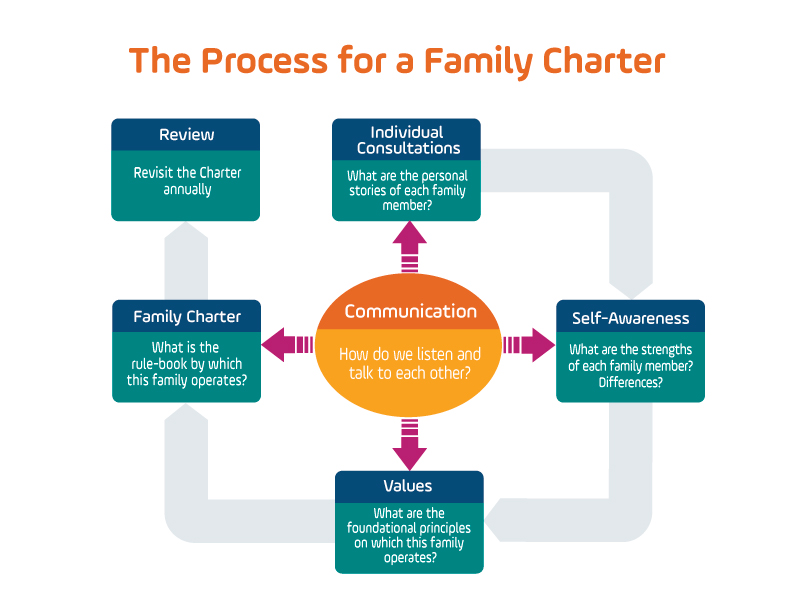
The essential tool for assisting this whole communication process and gaining consensus on the 'rules' is called the Family Charter (sometimes called a family constitution). This is a written agreement and a kind of contract between family members. It's the principles, rules and policies that the family agree on and is usually based on a discussion first up on family values and what's important and what the family stands for.
This process of determining how to move forward is where an independent Consultant/Coach can talk to individual members, talk to the group as a whole, and open up the lines of communication so that the family can resolve any issues and not be left with "unfinished business" in the form of bad feelings and resentment.
A tall order maybe given that some families entrench themselves into corners, egos rule the day, and then when they are all in crisis, they call in the Consultant "Rehabilitative" Coach.
Proactive families see the issues coming long before they arrive and call in the Consultant "Preventative" Coach as a wise protective measure.
The motto is of course, "the earlier the better".

